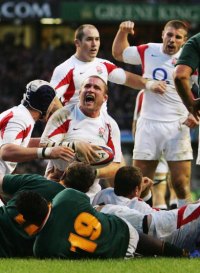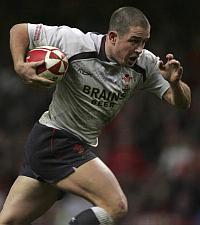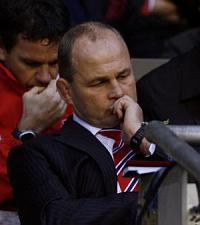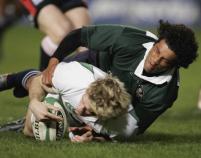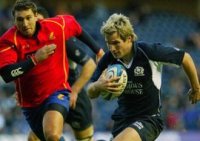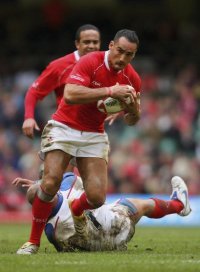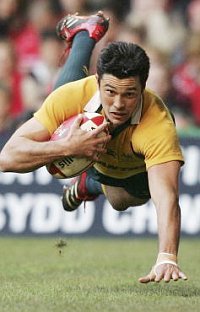Paris falls to Carter's charms
New Zealand completed a series whitewash over France courtesy of a hard-fought 23-11 victory at Stade de France in Paris on Saturday evening. The locals put in a hugely improved performance, even notching up the day's first try, but the All Blacks warmed to the task and order was soon restored via the impeccable orchestration of Daniel Carter.

Vive la difference! Well, they did for a while anyway. When Cédric Heymans took Florian Fritz's pass and scored the opening try after eight minutes it looked as though the new joie de vivre running through the French team's veins might be enough to cause a surprise.
Sadly, the ensuing 32 first-half minutes were more than enough of a reminder that this New Zealand has far too much of the je ne sais quoi up top to be ruffled by such a tiny faux pas as the drop of a high ball by Leon MacDonald which led to Heymans' try.
Right on the half-time whistle the Kiwis produced their most exquisite moment of le jeu beau yet to send Rokocoko in at the corner, and the game settled into an all-too-familiar pattern thereafter.
Quelle dommage (and here the awful bon mots cease) for France's rather dour tactics -- the same pattern of kicks and line-out forward drives as last week -- were more effective because of the added zeal which with the French went about their tasks, and briefly threatened an upset.
There were a lot of aspects different about this night from the nightmare of Lyon seven days ago. The glittering Stade de France and its space-age light and roof provided an altogether grander platform for one.
Then there was the preparation of the French team. Run into the ground by their heavy club workload and by a gruelling Bernard Laporte schedule last week, the French squad apparently enjoyed a large proportion of this week relaxing. It paid off, there were far more beans filling the French frames.
It was appropriate that this should be the training schedule before the night that celebrated the 100th anniversary of France's first-ever Test against New Zealand -- it was probably a similar schedule in those days, although with different pre-match diets. The French jerseys were the same as 100 years ago and different from last week, and the spirit of the players was too.
Right from the first minute, when New Zealand claimed their own kick-off but were driven back some ten metres in the tackle, you sensed that France were more up for it. Unfortunately, right from the second minute, when Dan Carter charged down Damien Traille's kick and nearly scored, you sensed that just being more up for it might not be enough.
Traille is not the answer at fly-half for France. His kicking boot may be powerful, but comparing his boot to Carter's in terms of balancing power and precision is like comparing a sawn-off shotgun to a expertly-crafted, telescopically-sighted, high calibre hunting rifle. In the fourth minute, Traille fired a kick down the field vaguely to the left and to the waiting Carter, whose return swept over the pitch and bounced flawlessly into touch in the French 22.
Carter is a better runner, but fly-halves are not always selected for running. However Traille offered very little beyond static passes and meat-and-veg kicks to the New Zealand cover. There was not a shred of invention to be seen, and when you are facing Collins, So'oialo, and Nonu, you have to have something extra that will make them cautious about burying you into the turf. Otherwise ...
Carter put New Zealand ahead after three minutes with a penalty, but five minutes later MacDonald's howler -- quite where he thought the ball would land is a mystery but it could have been Lyon, so far was he away from it -- let Heymans in for France's try.
It was, on the basis of enthusiasm, deserved. Where last week the French had slithered off the All Blacks as though they were covered in linseed oil, the tackles this week were square-shouldered, head-on, high-speed, and aimed at the thighs. Traille's kick that led to the try was from turnover ball, something the French managed six times altogether, and the All Blacks looked unsettled.
Soon enough though, in the manner that sets them apart from other mortals, the visitors found their rhythm. Carter made the score 5-6 with his second penalty after Jean-Baptiste Elissalde was accused of collapsing a maul which the All Blacks had driven 25m. Then, Sitiveni Sivivatu launched a counter-attack which ought to have culminated in a try but Nonu ignored three support runners.
The forward battle was intriguing. France were once again capable in the mauls, but in the scrum they looked alarmingly weak. In the 23rd minute, they were comprehensively shoved off their own ball, and Carter was only foiled on the turnover by an excellent cover tackle from Elissalde and full-back Pepito Elhorga. All of New Zealand's other scrums bar one had to be reset at least twice, a sure sign that the other team is struggling.
That tackle ended Elissalde's involvement in the game, and Yachvili was never in the same class against the bustling Kelleher. Kelleher's break led to Carter's third penalty on the half-hour after a hand in the ruck, and finally on half-time came the inevitable try.
It was worth waiting for. MacDonald, who had had a miserable first half, dropping two easy passes as well as the early high ball, made amends by searing past Fritz. So'oialo and McCaw did the link work and drew in the defenders, and then wide it went to Sivivatu, Carter, and finally to Joe Rokocoko, who got past Rougerie at the second time of asking for another classy All Black score. Carter converted for a 5-16 half-time scoreline.
The ten minutes after the break were one-way traffic. Wave after wave of All Black pressure hit the French wall, budging it back metre by hard-earned metre, until finally Carter switched sublimely (it could have been King Carlos himself) with Nonu to send the latter under the posts and to take the score to 5-23 with half an hour still to play.
Then we saw just how complete this New Zealand team is. France battled their way back, and enjoyed some 70 per cent of the possession thereafter. But not once did they ever look like scoring, even when the silly kicks were abandoned for more direct line-busting methods. Collins, So'oialo, and Nonu stood out for the tackle rate, but every All Black player did his bit, in a defensive display that impressed far more than the clever tries. The two penalties conceded were bare irritations to the scoreline, nothing to the result.
Only once, in the final minute, was the defence genuinely pierced, and even then four cover tacklers herded Rougerie into a blind corner. That was one of the very very rare occasions that France even made it into the All Black 22.
Over two Tests, New Zealand have beaten France in France by nine tries to one and 70 points to 14. In both matches they gave the appearance of being in second gear for half the time. Is there anything that can be done?
Man of the match: For France, Jean-Baptiste Elissalde was having a stormer before his injury, Cedric Heymans was everywhere, and Julien Bonnaire was a real nuisance at the breakdown. In the black shirts, Dan Carter was on song, Ma'a Nonu was threatening, and Richie McCaw a mirror of Bonnaire. But for the work in the final half hour, Jerry Collins get the award for a magnificent physical tackling and defending performance.
Moment of the match: Joe Rokocoko's try. 50 metres and six passes of champagne in crystal glasses.
Villain of the match: Not a whiff of trouble.
The scorers:
For France:
Try: Heymans
Pens: Yachvilli 2
New Zealand:
Tries: Rococoko, Nonu
Cons: Carter 2
Pens: Carter 3
Teams:
France: 15 Pépito Elhorga, 14 Aurélien Rougerie, 13 Florian Fritz, 12 Yannick Jauzion, 11 Cédric Heymans; 10 Damien Traille, 9 Jean-Baptiste Elissalde, 8 Elvis Vermeulen, 7 Rémy Martin, 6 Julien Bonnaire, 5 Pascal Papé, 4 Lionel Nallet, 3 Pieter de Villiers, 2 Raphael Ibañez (captain), 1 Olivier Milloud.
Replacements: 16 Dimitri Szarzewski, 17 Sylvain Marconnet, 18 Loïc Jacquet, 19 Serge Betsen, 20 Dimitri Yachvili, 21 David Marty, 22 Christophe Dominici.
New Zealand: 15 Leon MacDonald, 14 Joe Rokocoko, 13 Mils Muliaina, 12 Ma'a Nonu, 11 Sitiveni Sivivatu, 10 Dan Carter, 9 Byron Kelleher, 8 Rodney So'oialo, 7 Richie McCaw (captain), 6 Jerry Collins, 5 Ali Williams, 4 Chris Jack, 3 Carl Hayman, 2 Keven Mealamu, 1 Tony Woodcock.
Replacements: 16 Andrew Ho re, 17 Neemia Tialata, 18 Jason Eaton, 19 Chris Masoe, 20 Andy Ellis, 21 Nick Evans, 22 Luke McAlister.
Referee: Chris White (England)
Touch judges: Donal Courtney, Simon McDowell (both Ireland)
Television match official: Carlo Damasco (Italy)
